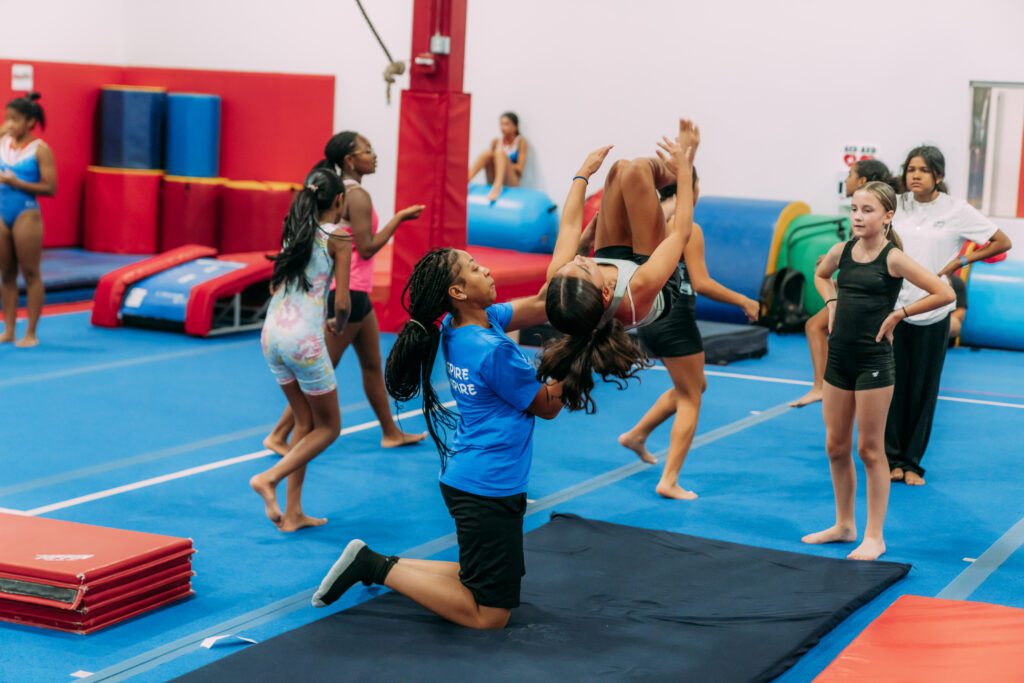Why Gymnastics Improves Focus, Memory, and Learning
Watching the gravity-defying strength, feats and flips of champion gymnasts, we’ve all had occasion to wonder what exactly is going on inside their minds. The drive and focus we’ve all seen great athletes possess — where do they come from? Why do the greats always seem so sharp?
The discipline and mental agility of gymnastics are crucial — and can have an immediate effect on academic skills. As parent advocates we love talking about the links you can easily observe between physical activities and your child’s cognitive growth.
Lots of kids these days struggle with focus during homework time. Gymnastics can help our children with not only coordination, but concentration too. Today, let’s look at cognitive benefits of gymnastics — enhanced focus, concentration, memory; the problem-solving abilities we develop — and how they pave the way for academic improvement.
Mind and Body Connection
The focus is usually on the physical benefits of gymnastics: the strength, flexibility and coordination athletes are known for. These are undoubtedly important skills. But the sport’s mental aspects are just as profound.
Consider also the complex physical routines of our best gymnasts: every movement requires both intense focus and the most precise execution. It’s a level of intense concentration that keeps you fully engaged, with minimal distractions — perfect skills for the classroom.
1) Focus and Concentration
Gymnastics demands our undivided attention, both for simple safety and in the pursuit of excellence. We learn to block out external stimuli and concentrate on the task at hand. Through practice and a structured environment, children can learn to follow instructions, remember sequences, and stay focused on their movements. It all builds the neural pathways we each need to really concentrate during the day.
2) Memory and Sequencing
Gymnastics routines are intricate sequences of movements; they strengthen both working and long-term memory. In classes, kids learn to recall steps, then learn to make safe transitions, and finally put together entire routines. Information recall is a huge part of academic success, whether it’s used for learning multiplication tables or putting together historical names and dates.
3) Problem-Solving and Critical Thinking
It’s not just about executing perfect routines on command: gymnastics is also about responding to problems and challenges, like mastering a new skill or equipment. We analyze the problems before us, develop strategies to overcome them — and until we succeed, we persevere. These are critical thinking abilities kids need for tackling ever more complex academic tasks.
Those who struggle with spatial reasoning can also learn and develop it through gymnastics. Visualizing movements, and understanding how our bodies move in space, are crucial in the gymnasium — and for life.

Discipline and Structure
Discipline and structure have their place in gymnastics. Kids learn to follow rules, respect their coaches, and keep a structured schedule. This means better time management, organization and study habits down the line. Correctly following instructions and keeping organized are essential for academics.
Time Management and Organization
The structured environment of gymnastics classes helps with developing time management. Kids can learn to be punctual, follow schedules and manage time effectively… All of which transfer to academic settings, where we must balance homework, projects and other responsibilities.
Perseverance and Resilience
Gymnastics is about getting through challenges and setbacks with our willpower. Just like resistance in weight makes us strong, challenges are the most important part of learning — they show us exactly how to get where we want, using hard work and dedication.
Likewise, it’s rare that we are able to hit a goal on the first try. We may have to revisit a challenge more than once in order to reach our goals. This resilience is crucial for academic success, where we’ll inevitably face lots of different kinds of challenges, making it one of the most powerful gifts we can offer our kids.
Discipline and Structure
Let’s look at what we’ve learned — these are the less-mentioned benefits a gymnastics education offers:
- Cognitive Development: Gymnastics enhances memory, focus and problem-solving by teaching timing, visualization and routine. A structured environment means greater discipline and time management as we learn to balance our own wants and needs with our obligations.
- Emotional Development: We build confidence, resilience and emotional regulation through meeting and overcoming challenges. Taking harder and harder wins in gymnastics gives us a greater emotional stability and flexibility elsewhere — and not just academically, either. Recommended read: How Gymnastics Unlock Emotional and Social Growth
- Physical Development: Beyond the obvious, improved coordination and spatial awareness both support further brain and nervous system development.
Focus, memory, problem-solving and discipline are all major ingredients of a strong foundation for learning — and they can be particularly hard to teach! Yet, every day at Dominique Dawes Gymnastics and Ninja Academy, we regularly see the transformative power of creating a structured, supportive environment. We offer expert coaching, age-appropriate activities, and a focus on fun and engagement. Reach out to learn more and enroll today!

